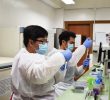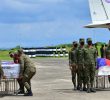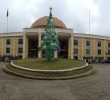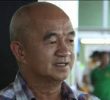The missioners have come this far, but being with the people that the late priest served is worth all the long and difficult travel. After all, to them, it is a way of paying tribute to the man and the work he did as Christ’s follower, which is to fulfill Christ’s teachings of helping the poor and the underserved.
By JOHN RIZLE L. SALIGUMBA
Davao Today
TALAINGOD, Davao del Norte, Philippines — The mission of slain Italian missionary Father Fausto ‘Pops’ Tentorio to work among the marginalized peasants and indigenous peoples in Southern Mindanao, continue to inspire many, locals and foreigners alike.
Tentorio, a missionary based in Arakan Valley, Cotabato Province for nearly thirty years, was killed last October 17 inside the compound of his parish by a gunman believed to be connected with government military forces.
The missionary is a known advocate of the environment and the struggles of indigenous peoples in the hinterlands of Davao City and the provinces of Cotabato, Bukidnon and Davao del Norte.
On August 12, they found themselves on the road that Father Pops himself once took: the path to Talaingod, a highland municipality in Davao del Norte which is home to Ata-Manobos who are still struggling from being robbed off of their ancestral land.
Delegates from various churches in the United States, 22 of them Filipino-Americans and Americans, travelled halfway from across the world to Sitio Dulyan in Palma Gil village of Talaingod where a school that Fr. Tentorio helped established is located.
The school, the venue of the mission, saw the gathering of foreign missioners, and delegates from various local organizations that provided medical services to more than a thousand Ata-Manobos who walked for days from their communities just to avail of them.
Jolo Buktaw, a missioner from a California-based Advocacy Ministry of the Rosewood United Methodist Church, saw for himself how needy the lumads have become.
“They walked for almost a week just to get here in time for the mission, just to get proper treatment and medicine,” he said.
The Ata-Manobos who were served by the mission belong to the Salugpungan Ta ‘Tanu Igkanugon, an organization borne of the unity of lumad communities in Talaingod who fought the wood company, Alcantara and Sons (Alsons) when it tried to enter their areas. (See Related Story: The Fugitive of Talaingod)
In the 1990s, Alsons claimed thousands of hectares of lumad ancestral land in Talaingod under the Integrated Forest Management Agreement (IFMA), but this was thwarted by the Ata-Manobos led by Datu Guibang Apoga who fought the company guards with their spears and arrows.
While Guibang and fellow datus believed that they only acted in defense of their land, charges of common crimes were filed against them. As a consequence, their communities suffered further.
Seeing beyond government neglect
The missioners who came saw this for themselves. They understood that there is more beyond the lumads’ suffering in terms of government’s negligence of providing basic social services.
Up to this day, the lumads under Salugpungan have continued to parry countless other forms of disenfranchisement of the right to their ancestral domain.
After Alson’s IFMA, other private business-led projects came, including a hydro-powered dam project and a mining application.
With the country’s mining laws, such as the Philippine Mining Act of 1995, and recently, President Aquino’s latest promulgation on mining, Executive Order 79, the communities of Salugpungan face more threats of land usurpation by private businesses, particularly, of foreign multinational companies.
In the course of resisting the entry of such projects that would only mean dispossession of their ancestral lands, they have also been put at the receiving end of human rights abuses, particularly perpetrated by state security forces who are at the forefront of quelling resistance.
For Buktaw, what the lumad communities they visited experienced was injustice. And for this, he and his fellows, believe that they could do something more.
Spreading the word
“Our mission does not end after we leave Davao. It will just begin as we share the stories and bring back what we have learned here,” Buktaw said.
The missioners vowed they were going to make sure they will come back and provide more of the lumads’ material needs. But more than this, they pledged advocacy.
For Bert Mendoza, President of Filipino Caucus, an organization which covers 28 Fil-Am Methodist churches in Southern California, they can start by calling the attention of their government to cancel its aid for a country that neglects the rights of its people, particularly the indigenous peoples.
“Our (US) government will listen only if the international community calls its attention,” Mendoza said.
Furthermore, Mendoza said they can also lobby that their government’s budget for aid to the Philippines be cut in the face of the human rights abuses committed by state security agents against Filipinos.
For Reverend Sandie Richards of the United Methodist Church of Los Angeles, California the condition of the lumads of Talaingod only mirrors the continuing plunder of the interests of multinational companies.
“It’s an outrage that the resources of this beautiful land are being consumed and destroyed by multinational and US interests,” she said, adding that it is supposed to be the interest of the Philippines that the Filipino people use the resources for their own nation instead of enriching other nations, particularly the wealthy ones, especially,
their country, the United States.
She further lamented over the situation of most Filipinos who are forced to go abroad even if it means leaving their families behind.
“The women, for instance, who care for other children overseas should be home, caring for their own children, they should be able to make living wages and take care of their own families,” Richards said.
Buktaw summed up the things they could do into four urgent tasks:
First, to know the human rights situation in the Philippines, particularly in Mindanao; second, to assert environmental justice; third, to advocate for the health and welfare of the indigenous peoples; and lastly would be to muster support so they can provide more of the social needs, especially, on medical care.
The missioners have come this far, but being with the people that the late priest served is worth all the long and difficult travel. After all, to them, it is a way of paying tribute to the man and the work he did as Christ’s follower, which is to fulfill Christ’s teachings of helping the poor and the underserved. (John Rizle L. Saligumba/davaotoday.com)
World









